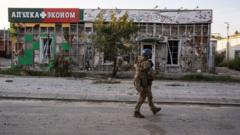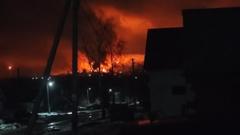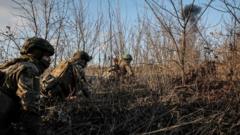**Vladimir Putin's recent threat to target Ukrainian decision-makers follows a substantial missile strike that left over one million without power, igniting further warnings from President Zelensky about the ongoing conflict.**
**Putin Issues Threats to Kyiv Amid New Energy Strikes**

**Putin Issues Threats to Kyiv Amid New Energy Strikes**
**Russian missile assault targets Ukraine's infrastructure as tensions escalate**
The already heightened military tension between Russia and Ukraine escalated when Russian President Vladimir Putin explicitly threatened to target decision-making centers within Kyiv after an intensive missile assault on Ukraine’s energy grid late Wednesday night. This strike, characterized by the use of 90 missiles and 100 drones, was presented as retaliation for Ukraine's recent attacks on Russian territory using U.S.-supplied Atacms missiles.
Putin unveiled the Oreshnik, a new ballistic missile the Russian military claims is currently indomitable by interception systems. Although U.S. officials are skeptical regarding the fulfillment of this claim—regarding the limited availability of Oreshnik missiles—Putin's announcement raises concern within NATO and among Ukraine's allies.
President Volodymyr Zelensky condemned the attacks in his nightly address, stressing that Russia’s use of cluster munitions against civilians is particularly egregious. He warned that any form of Russian “blackmail” would provoke a decisive Ukrainian response. Zelensky emphasized the international dimensions of the conflict, hinting at Putin's intentions to leverage the crisis to sway the United States.
While reports indicated no immediate casualties from the missile strike, the disruption was palpable. More than one million Ukrainians experienced power outages, primarily impacting major cities like Odesa and Kharkiv, leading local authorities to implement emergency measures to stabilize the energy grid. The strike was comprehensive enough to affect twelve regions across Ukraine, leaving extensive damage in its wake.
As the population braced for a potentially harsh winter, concerns regarding the potential for further missile attacks on energy infrastructure loomed large. Observers noted mounting fears that Russia is aggressively stockpiling munitions for coordinated strikes on Ukraine's power systems, a tactical situation exacerbated by the onset of colder weather.
The unbroken chain of Russian assaults on infrastructure since the onset of the invasion marks a worrying trend, according to DTEK, Ukraine’s largest private energy provider. The company reported significant damage due to previous strikes, describing Thursday's incident as the eleventh critical attack on Ukraine's energy landscape since March, raising questions about the ability to withstand another devastating winter amid ongoing hostilities.
Putin unveiled the Oreshnik, a new ballistic missile the Russian military claims is currently indomitable by interception systems. Although U.S. officials are skeptical regarding the fulfillment of this claim—regarding the limited availability of Oreshnik missiles—Putin's announcement raises concern within NATO and among Ukraine's allies.
President Volodymyr Zelensky condemned the attacks in his nightly address, stressing that Russia’s use of cluster munitions against civilians is particularly egregious. He warned that any form of Russian “blackmail” would provoke a decisive Ukrainian response. Zelensky emphasized the international dimensions of the conflict, hinting at Putin's intentions to leverage the crisis to sway the United States.
While reports indicated no immediate casualties from the missile strike, the disruption was palpable. More than one million Ukrainians experienced power outages, primarily impacting major cities like Odesa and Kharkiv, leading local authorities to implement emergency measures to stabilize the energy grid. The strike was comprehensive enough to affect twelve regions across Ukraine, leaving extensive damage in its wake.
As the population braced for a potentially harsh winter, concerns regarding the potential for further missile attacks on energy infrastructure loomed large. Observers noted mounting fears that Russia is aggressively stockpiling munitions for coordinated strikes on Ukraine's power systems, a tactical situation exacerbated by the onset of colder weather.
The unbroken chain of Russian assaults on infrastructure since the onset of the invasion marks a worrying trend, according to DTEK, Ukraine’s largest private energy provider. The company reported significant damage due to previous strikes, describing Thursday's incident as the eleventh critical attack on Ukraine's energy landscape since March, raising questions about the ability to withstand another devastating winter amid ongoing hostilities.





















